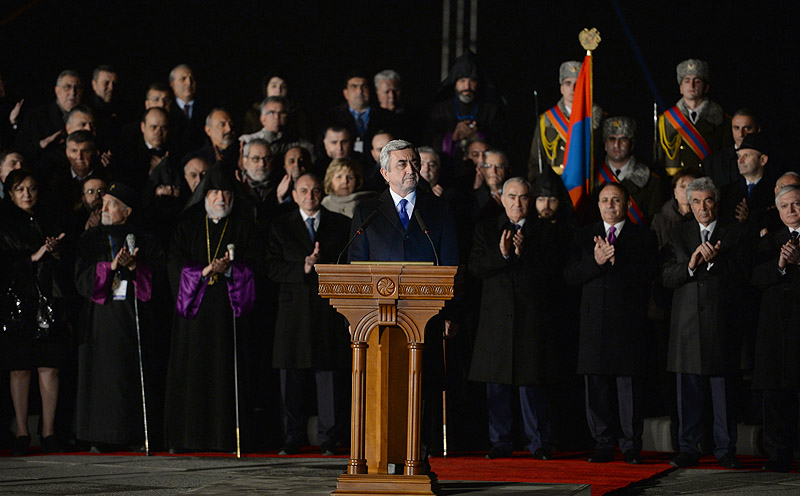Following the session of the State Commission on Coordination of the events for the commemoration of the 100th anniversary of the Armenian Genocide, President Serzh Sargsyan, in company with the commission members and the participants of the enlarged session, today visited the Tsitsernakaberd Memorial Complex, laid a wreath at the Memorial to the Victims of the Mets Eghern and paid tribute to the memories of the innocent victims. Later on, the members of the state commission familiarized with the preparatory works of the new exhibition to be held at the Armenian Genocide Museum-Institute.
At the Tsitsernakaberd Memorial Complex there also took place the promulgation ceremony of the Pan-Armenian Declaration on the 100th Anniversary of the Armenian Genocide. The declaration was adopted unanimously at today’s session of the State Commission on Coordination of the events for the commemoration of the 100th anniversary of the Armenian Genocide. President Serzh Sargsyan read the document and pursuant to the resolution of the the State Commission on Coordination of the events for the commemoration of the 100th anniversary of the Armenian Genocide, deposited the original copy of the declaration with the Armenian-Genocide Museum-Institute. The Armenian President noted that one of copy of the declaration will be sent to the Secretary-General of the United Nations and one will be deposited in the National Archives of the Republic of Armenia.
***
Pan-Armenian Declaration on the Centennial of the Armenian Genocide
The State Commission on the Coordination of Events Dedicated to the 100th Anniversary of the Armenian Genocide, in consultation with its regional committees in the Diaspora,
-expressing the united will of the Armenian people,
-based on the Declaration of Independence of Armenia of 23 August 1990 and the Constitution of the Republic of Armenia,
-recalling the United Nations Universal Declaration of Human Rights of 10 December 1948, whereby recognition of the inherent dignity and of the equal and inalienable rights of all members of the human family is the foundation of freedom, justice and peace in the world,
-guided by the respective principles and provisions of the United Nations General Assembly Resolution 96(1) of 11 December 1946, the United Nations Convention on the Prevention and Punishment of the Crime of Genocide of 9 December 1948, the United Nations Convention on the Non-Applicability of Statutory Limitations to War Crimes and Crimes Against Humanity of 26 November 1968, the International Covenant on Civil and Political Rights of 16 December 1966 as well as all the other international documents on human rights,
-taking into consideration that while adopting the Convention on the Prevention and Punishment of the Crime of Genocide, the United Nations specifically underlined the importance of international cooperation in the struggle against that criminal offence,
-emphasizing the inadmissibility of impunity of the constituent elements of the crime of genocide and the non-applicability of statutory limitation thereto,
-condemning the genocidal acts against the Armenian people, planned and continuously perpetrated by the Ottoman Empire and various regimes of Turkey in 1894-1923, dispossession of the homeland, the massacres and ethnic cleansing aimed at the extermination of the Armenian population, the destruction of the Armenian heritage, as well as the denial of the Genocide, all attempts to avoid responsibility, to consign to oblivion the committed crimes and their consequences or to justify them, as a continuation of this crime and encouragement to commit new genocides,
– also considering the 1919-1921 verdicts of the courts-martial of the Ottoman Empire on that grave crime perpetrated “against the law and humanity’’ as a legal assessment of the fact,
– appreciating the joint declaration of the Allied Powers on May 24, 1915, for the first time in history defining the most heinous crime perpetrated against the Armenian people as a “crime against humanity and civilization” and emphasizing the necessity of holding Ottoman authorities responsible, as well as the role and significance of the Sevres Peace Treaty of 10 August 1920 and US President Woodrow Wilson’s Arbitral Award of 22 November 1920 in overcoming the consequences of the Armenian Genocide:
1. Commemorates one-and-a-half million innocent victims of the Armenian Genocide and bows in gratitude before those martyred and surviving heroes who struggled for their lives and human dignity.
2. Reiterates the commitment of Armenia and the Armenian people to continue the international struggle for the prevention of genocides, the restoration of the rights of people subjected to genocide and the establishment of historical justice.
3. Expresses gratitude to those states and international, religious and non-governmental organizations that had political courage to recognize and condemn the Armenian Genocide as a heinous crime against humanity and even today continue to undertake legal measures to that end, also preventing the dangerous manifestations of denialism.
4. Expresses gratitude to those nations, institutions and individuals, who often endangering their lives, provided multifaceted humanitarian assistance and rescued many Armenians facing the threat of total annihilation, created safe and peaceful conditions for the survivors of the Armenian Genocide, thus promoting orphan care and the international Armenophile movement.
5. Appeals to UN member states, international organizations, all people of good will, regardless of their ethnic origin and religious affiliation, to unite their efforts aimed at restoring historical justice and paying tribute to the memory of the victims of the Armenian Genocide.
6. Expresses the united will of Armenia and the Armenian people to achieve worldwide recognition of the Armenian Genocide and the elimination of the consequences of the Genocide, preparing to this end a file of legal claims as a point of departure in the process of restoring individual, communal and pan-Armenian rights and legitimate interests.
7. Condemns the illegal blockade of the Republic of Armenia imposed by the Republic of Turkey, its anti-Armenian stance in international fora and the imposition of preconditions in the normalization of interstate relations, considering this a consequence of the continued impunity of the Armenian Genocide, Meds Yeghern.
8. Calls upon the Republic of Turkey to recognize and condemn the Armenian Genocide committed by the Ottoman Empire, and to face its own history and memory through commemorating the victims of that heinous crime against humanity and renouncing the policy of falsification, denialsm and banalizations of this indisputable fact.
Supports those segments of Turkish civil society whose representatives nowadays dare to speak out against the official position of the authorities.
9. Expresses the hope that recognition and condemnation of the Armenian Genocide by Turkey will serve as a starting point for the historical reconciliation of the Armenian and Turkish peoples.
10. Proudly notes that during the last century the Armenian people, having survived the Genocide,
– Demonstrated an unbending will and national self-consciousness and restored its sovereign statehood, lost centuries ago,
– Preserved and developed national values, achieved the renaissance of their national culture, science and education, bringing its unique contribution to the development of world heritage,
– established a powerful and effective network of religious and secular institutions in the Armenian Diaspora, thus contributing to the preservation of their Armenian identity in Armenian communities worldwide, the shaping of a respected and esteemed image of the Armenian, and the protection of the legitimate rights of the Armenian people,
– united and restored the national gene pool that was facing extermination as a result of the Genocide, through a pan-Armenian cooperation and extensive repatriation program,
– made its valuable contribution to international peace and security during the First and the Second World Wars and won glorious victories in the heroic battle of Sardarapat and the Artsakh war.
11. Considers the 100th anniversary of the Armenian Genocide an important milestone in the ongoing struggle for historical justice under the motto “I remember and demand”.
12. Calls upon the coming generations of Armenians to protect their sacred native heritage with patriotism, consciousness and intellect and resolutely struggle and serve for:
– a stronger Homeland, free and democratic Republic of Armenia,
– the progress and strengthening of independent Artsakh,
– the efficient unity of Armenians worldwide,
– the realization of the centuries-old sacrosanct goals of all Armenians.
26 January, 2015, Yerevan
Source: president.am















